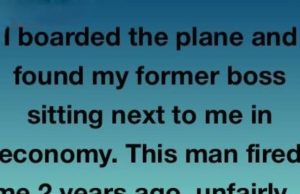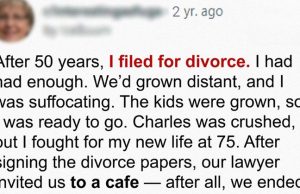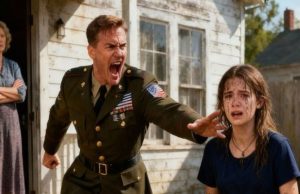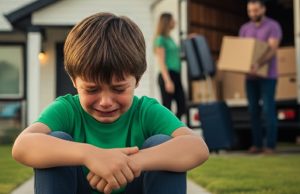
I was only eighteen when I found myself living through the worst moment of my life—laying both of my parents to rest, with my little brother Max, just six years old, clutching my hand and asking when Mom was coming back.
To make it even more surreal, the funeral fell on the day after my birthday. People tried to offer me a weak “Happy 18th,” but it was a cruel joke. I didn’t care about cake, gifts, or coming of age.
All I wanted was to protect Max. To stop hearing his innocent voice, ask questions no one could answer.
Still in funeral clothes, I knelt by their graves and whispered a promise. “I won’t let anyone take you. Ever.”
But life and family had other plans.
A week after the funeral, Aunt Diane and Uncle Gary invited us over. Their house was spotless, their kitchen smelled like cinnamon, and Max was distracted with dinosaur stickers.

Meanwhile, I was trapped at their perfect table, drinking cocoa I didn’t want, listening to their pitch.
“You’re still a kid, Ryan,” Diane said, her voice coated in phony sympathy. “You’re in school. You don’t have a job. Max needs routine, structure… a proper home.”
“A real home,” Gary added with rehearsed sincerity.
I bit down so hard on the inside of my cheek that I tasted blood.
These were the same relatives who forgot Max’s birthday for three straight years, who skipped Thanksgiving for vacation cruises—and now they were suddenly volunteering to be parental figures?
The next morning, I found out they had filed for custody.
That’s when it hit me—this wasn’t about concern. It was calculated. I didn’t know why yet, but something smelled off.
I wasn’t going to let them win.

I dropped out of college the same day. When the advisor asked if I was sure, I didn’t hesitate. School could wait. Max couldn’t. I
picked up two jobs—delivering food by day and cleaning offices at night. I moved us out of our childhood home into a cramped studio apartment where the mattress touched one wall and the futon the other.
The air smelled like stale pizza and cleaning supplies, but to Max, it was enough.
“It smells like home,” he said one night, curling into a blanket burrito with a smile.
That kept me going.
I filed for legal guardianship, knowing full well the odds weren’t in my favor. I was barely an adult, scraping by—but I loved my brother more than anything.
Then Diane struck again.
A social worker showed up at our door with a report that nearly made me collapse. She said I’d been accused of yelling at Max. That I left him alone. That I had hit him.
My world stopped.

But I wasn’t alone.
Our neighbor, Ms. Harper—a retired third-grade teacher who watched Max during my night shifts—stepped in like a guardian angel.
She marched into court with a folder full of notes, dressed like she meant business.
“That young man,” she said, pointing at me, “is raising his brother with more love than most children ever see.”
Her words bought us time. The judge allowed a delay and ordered supervised visits with Diane instead of full custody.
It wasn’t a total win, but it gave me a fighting chance.
Then came the day Max told me something that shattered my heart.
“She said if I don’t call her Mommy, I won’t get dessert,” he whispered, his small hands gripping my hoodie as I picked him up from her house.

I reassured him. “You only ever need one mommy—and she’s already in heaven.”
Later, as I took the trash out behind our apartment, I passed by Diane’s open kitchen window and heard her on speakerphone.
“We need to move this along,” she said. “Once we get custody, the state will release the trust fund.”
Trust fund?
I had no idea there even was one.
I spent the entire night researching, and my worst fear was confirmed. A $200,000 trust had been set aside for Max’s future. And Diane wanted it.
The next evening, I came back to the same spot outside her kitchen, phone in hand. This time, I recorded everything.
Gary’s voice echoed through the window. “Once we get the money, we can send Max to boarding school. Kid’s a handful.”
Then Diane’s smug laugh. “I just want a new car. Maybe that Hawaii trip.”
The next day, I handed the audio to my lawyer.

At the final hearing, Diane walked into the courtroom wearing pearls and carrying a tin of cookies like she was hosting a bake sale.
She smiled at the judge like she had the whole thing in the bag.
She had no idea what was coming.
My lawyer hit play, and their voices filled the courtroom.
Once the recording ended, the judge’s face changed—her expression shifted from neutral to disgusted. She stared directly at Diane.
“You tried to manipulate this court,” she said coldly, “and used a child as a means to access money meant for his future.”
Diane didn’t smile anymore. Her lipstick looked cracked. Gary’s face was ghost-pale.
They not only lost the case, but they were also investigated for attempted fraud. The cookies sat untouched on the table, forgotten.

The judge granted me full legal guardianship that day. She even recommended housing support due to my “exceptional efforts under extreme circumstances.”
Outside the courthouse, Max grabbed my hand tightly.
“Are we going home now?” he asked, eyes wide.
I knelt down and smiled. “Yeah, buddy. We’re going home.”
As we passed Diane on the steps, she didn’t say a word.
She didn’t have to.
Now, two years later, I’m working full-time and studying online. Max is thriving in second grade. He tells everyone I’m his hero. We still live in our tiny apartment. It’s not much, but it’s ours.
We argue about what movies to watch. We laugh too loudly at bedtime stories. And every night, before bed, he says thank you.
I tell him the same thing every time:
“I will never give up on you.”
And I never did.















